Here’s Why Chickens Can Eat Some Tomatoes
Can chickens eat tomatoes? I’ve done the research and I’m sharing why it’s safe to feed chickens some tomatoes but not all tomatoes. The last thing you want to do is make your chickens sick. So I want to encourage you to read before you feed!
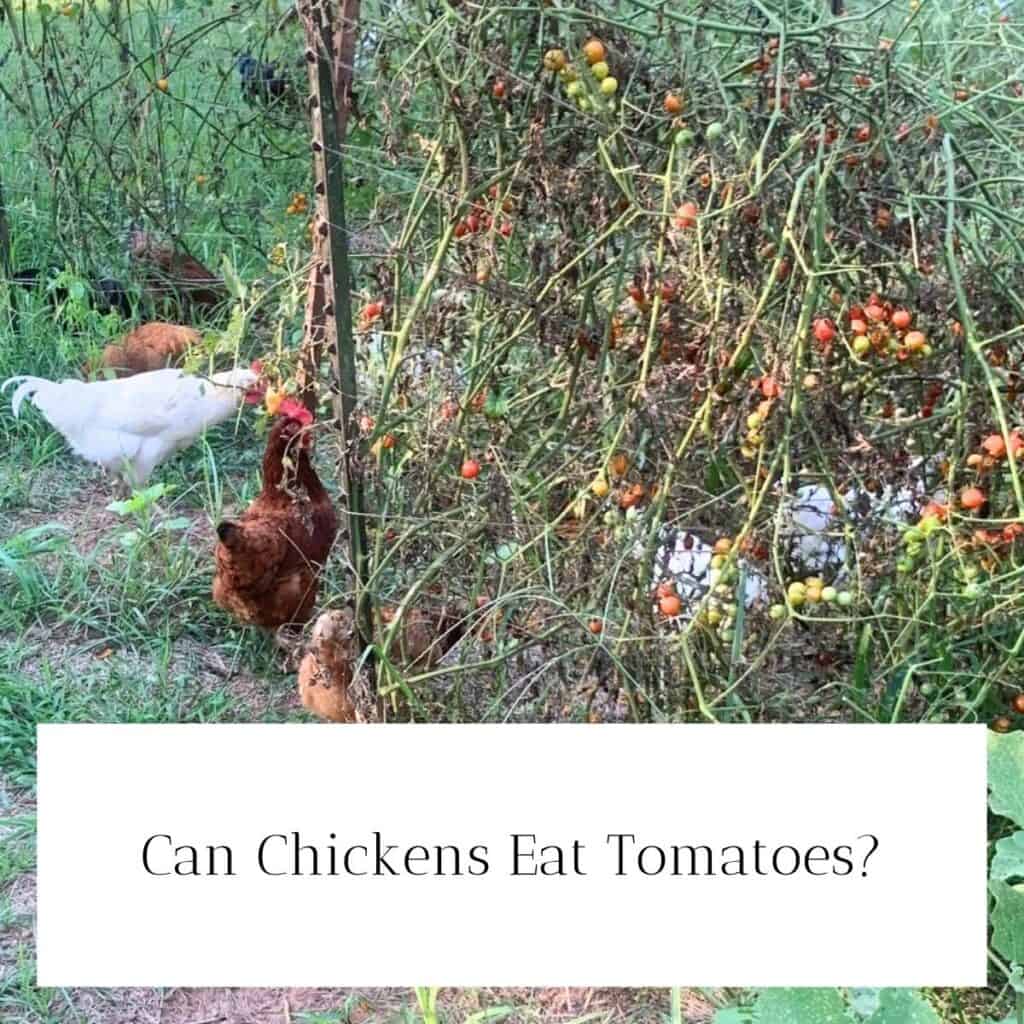
Growing tomatoes and keeping chickens are two of the most popular gateways into homesteading.
Chickens are the gateway farm animal and they are by far the easiest animals to care for on our farm. Likewise, tomato plants are the gateway garden plant that many of us start with.
But it’s important to know what you can and what you shouldn’t feed your backyard chickens. So before we go into the details, let’s answer the big question: Can chickens eat tomatoes?
Can chickens eat tomatoes?
Yes, chickens can eat some ripened tomatoes as a delicious and healthy treat. As long as your chickens are eating a balanced diet, eating tomatoes will not harm them. But there are some instances when you should avoid giving your chickens tomatoes.
Unless your chickens are are 100% free-range and can forage for their own food like ours do, poultry feed should be their primary food source. I wrote a blog post about how we raise our chickens without needing to buy chicken feed if you want to learn more.
From cherry tomatoes, paste tomatoes, beefsteak tomatoes, and everything in between, tomatoes are a tasty treat to include in your chicken’s diet. Tomato seeds, tomato skins, and tomato pulp have beneficial essential nutrients like vitamin c, vitamin e, and vitamin k.
You can safely give your chickens tomato sauce, tomato paste, tomato powder, and tomato juice. Raw tomatoes and cooked tomatoes are also fine chicken treats.
First I’ll share the health benefits of tomatoes and why you want to include them as a healthy snack.
- Egg nutrients increase when laying chickens eat tomatoes.
- Egg production may increase when laying chickens eat tomatoes.
Then we will discuss what your chickens shouldn’t eat.
- Feed unripe tomatoes sparingly to your chickens.
- Keep rotten tomatoes and moldy tomatoes away from your chickens.
- Avoid giving chickens tomato leaves, tomato stems, and tomato flowers.
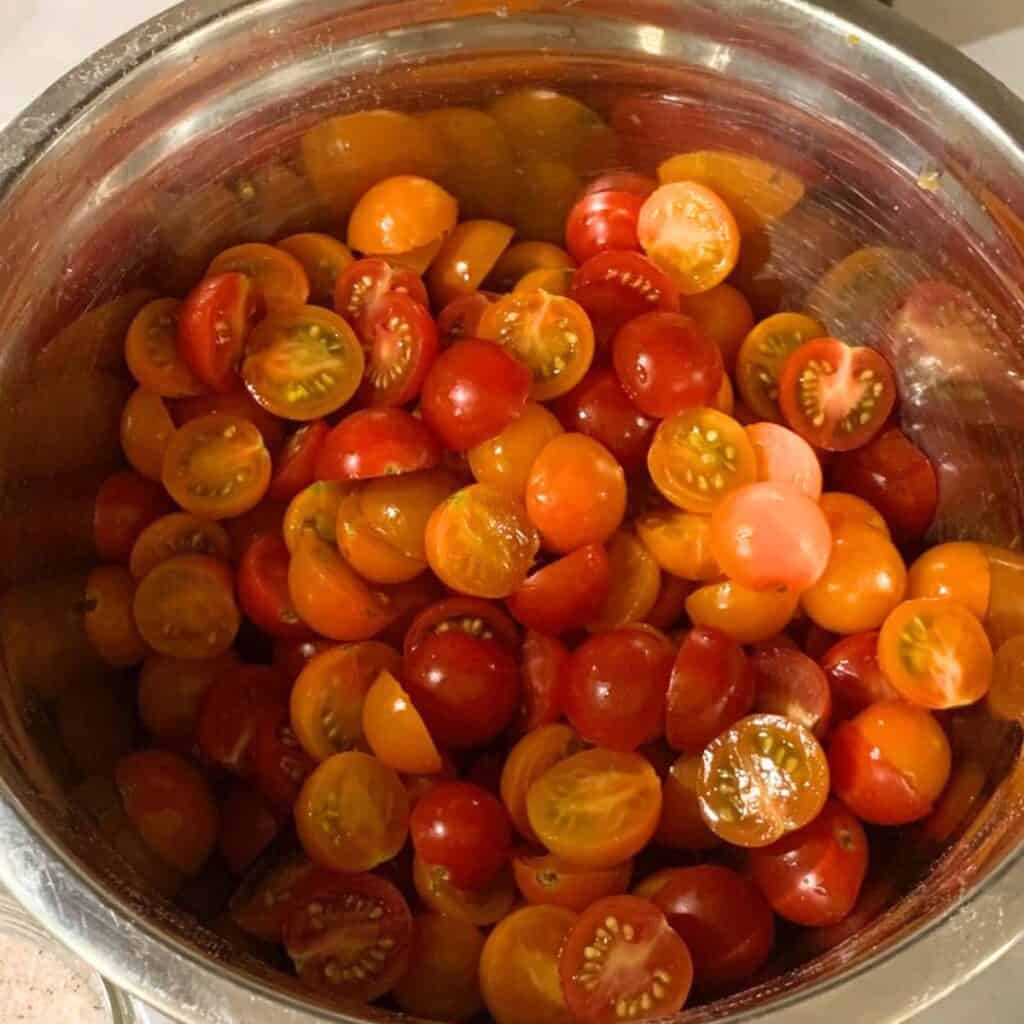
Egg nutrients increase when laying chickens eat tomatoes.
Scientific studies show concentrations of lycopene, beta carotene, lutein, and vitamin A increased in eggs from chickens who were given tomato powder with their regular poultry feed. Include up to 4 teaspoons per 2 pounds of poultry feed for best results.
A scientific study by British Poultry Science found that concentrations of beneficial nutrients increased when laying chickens ate tomatoes, and they also found that harmful malondialdehyde (MDA) decreased when tomato powder was included in the laying chickens’ diet.
Lycopene is an antioxidant that helps to lower cholesterol. It is a red pigment that is naturally present in fruits and vegetables, and red tomatoes have some of the highest levels of lycopene. Scientific journals have shown that lycopene helps reduce the risk of atherosclerosis and reduce the risk of coronary artery disease.
Beta carotene is a carotenoid and antioxidant that is also a crucial nutrient for good vision. The body converts beta carotene into vitamin A (retinol). Vitamin A helps maintain the health of your heart, lungs, kidneys, and skin.
Lutein is another carotenoid that helps keep your eyes healthy. Some people take lutein to prevent age-related macular degeneration and cataracts but you should consult with your doctor if you’re interested in doing this.
Vitamin A is an antioxidant that’s important for healthy vision, growth, cell division, reproduction, and immunity.
MDA is a reactive aldehyde that causes toxic stress in cells. One study showed that the corneas (clear layer of the eye in front of the iris and pupil) of patients suffering with kerotoconus (when the cornea thins out and bulges like a cone) and bullous keratopathy (blister-like swelling of the cornea) had elevated levels of MDA while healthy corneas showed little or no MDA.
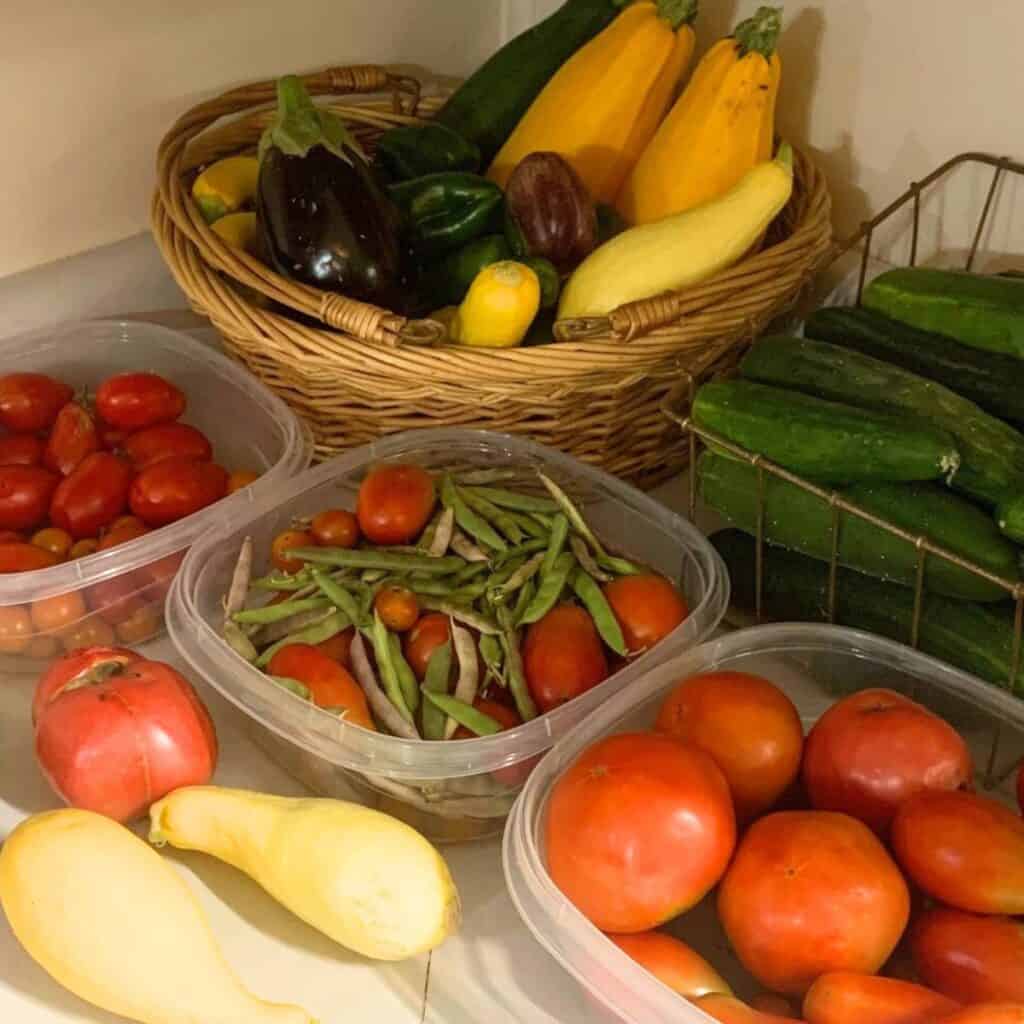
Egg production may increase when laying chickens eat tomatoes.
Some studies have suggested that feeding chickens 2 teaspoons of tomato powder per 2 pounds of feed increased egg production, egg weight, and deepened the egg yolk color. The shell weight and shell thickness didn’t change.
I ran across a scientific study by British Poultry Science that tested three separate groups of laying hens. One group was given a normal, balanced diet. Another group was given a normal diet plus 5 grams (about 5 mL or a bit more than 1 teaspoon) of tomato powder per kilogram (a bit more than 2 pounds) of regular feed. The last group was given a normal diet plus 10 grams (about 10 mL or a bit more than 2 teaspoons) of tomato powder per kilogram of feed.
The study found that egg production and egg weight increased relative to the amount of tomato powder given. The egg yolks also deepened in color in relative proportion.
However, another study concluded that there was no significant effect on chicken egg production or egg weight when chickens were given tomato powder. In looking at the results of that study, though, I did notice that egg production and egg weight was higher for the groups of chickens that were given tomato powder versus the chickens that didn’t have it.
I reckon when you’re talking about grams and small percentages, “significant” is in the eye of the beholder.
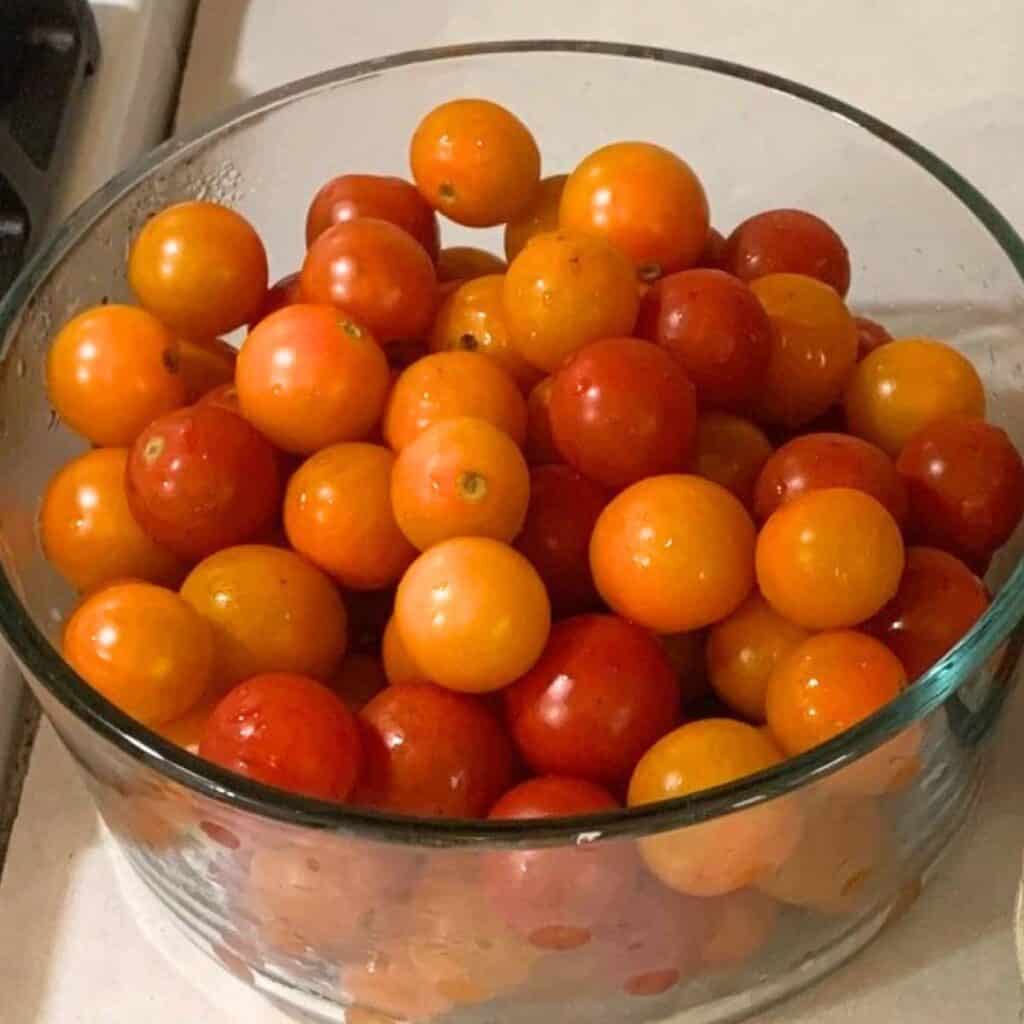
Feed unripe tomatoes sparingly to your chickens.
Tomatoes are a member of the nightshade family and you should avoid giving your chickens a lot of unripe fruits. Unripe fruits and the green parts of the plant in the nightshade family have toxic solanine, which is a poisonous alkaloid that affects the digestive system and nervous system.
The good news is that small amounts of unripe tomatoes won’t hurt you or your chickens. After all, fried green tomatoes are a popular side dish down here in the south!
Unripe green tomatoes have a bitter flavor and your chickens won’t gorge themselves out on them as long as they have other food to eat. As a general guideline, you should also avoid feeding your chickens large quantities of green potatoes, unripe eggplants, and uncooked beans or lentils that can cause adverse effects like gastrointestinal upset.
Don’t give baby chicks and young chicks unripened tomatoes. Their nutritional needs are different, so give them high quality, nutritious fruit instead.

Keep rotten tomatoes and moldy tomatoes away from your chickens.
Chickens can eat a wide variety of foods but avoid giving them large amounts of rotten or moldy tomatoes. Chickens that eat rotten and moldy foods can develop digestive issues like upset stomach and other serious health problems. And that will decrease their egg production.
So for all you poultry owners out there, stick with fresh tomatoes.
Avoid giving chickens tomato leaves, tomato stems, and tomato flowers.
Feed your chicken flock right and avoid giving them any green parts of the tomato plant that are high in toxic solanine. Ripe tomato fruit are a nutritious treat. But avoid eating the green parts of the whole tomato plant because it is part of the nightshade family.
Generally, chickens stay away from eating tomato plant leaves and stems.
All members of the nightshade family (tomato, potato, eggplant) are toxic if you eat the leaves, stems, or flowers. When you eat the wrong part of the tomato plant, you ingest toxic solanine.
Solanine poisoning can cause gastrointestinal disturbances such as vomiting, diarrhea, and abdominal pain. It can also cause severe symptoms, including fever, rapid pulse, low blood pressure, rapid respiration, and neurological disorders.
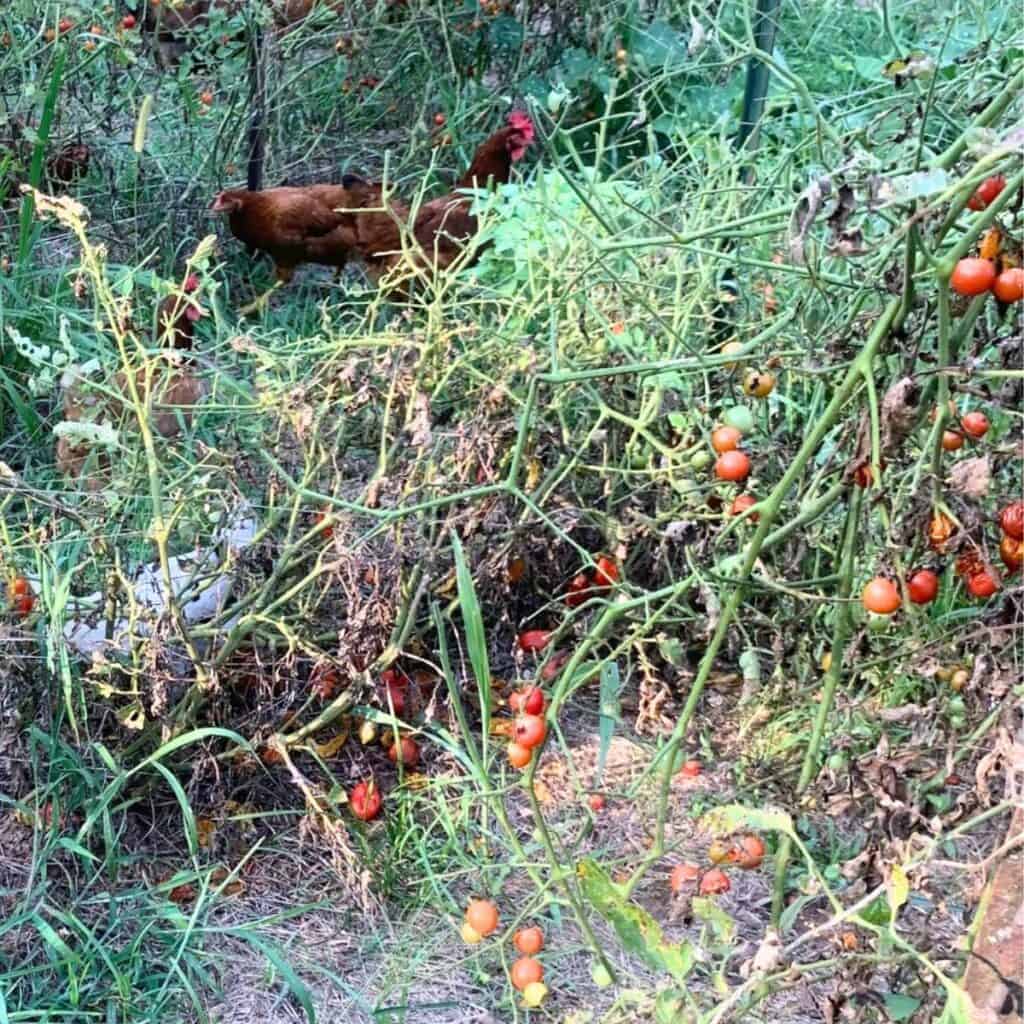
When should you feed chickens tomatoes?
We typically don’t have a ton of tomatoes laying around our farm kitchen because it’s seasonal produce and we don’t buy them from the grocery store. That said, the chickens sure do come in handy to clean up the late summer garden when we’ve harvested as much as we can off our tomato plants.
Our chickens eat any and all garden bugs they find, plus they eat the fallen tomatoes and pick the rest off the vine. Every tomato that falls to the ground will produce several more tomato plants the following year unless it’s cleaned up.
Using chickens for the garden cleaning crew makes it easier on me and they think they’re in Heaven!
Pin It For Later!
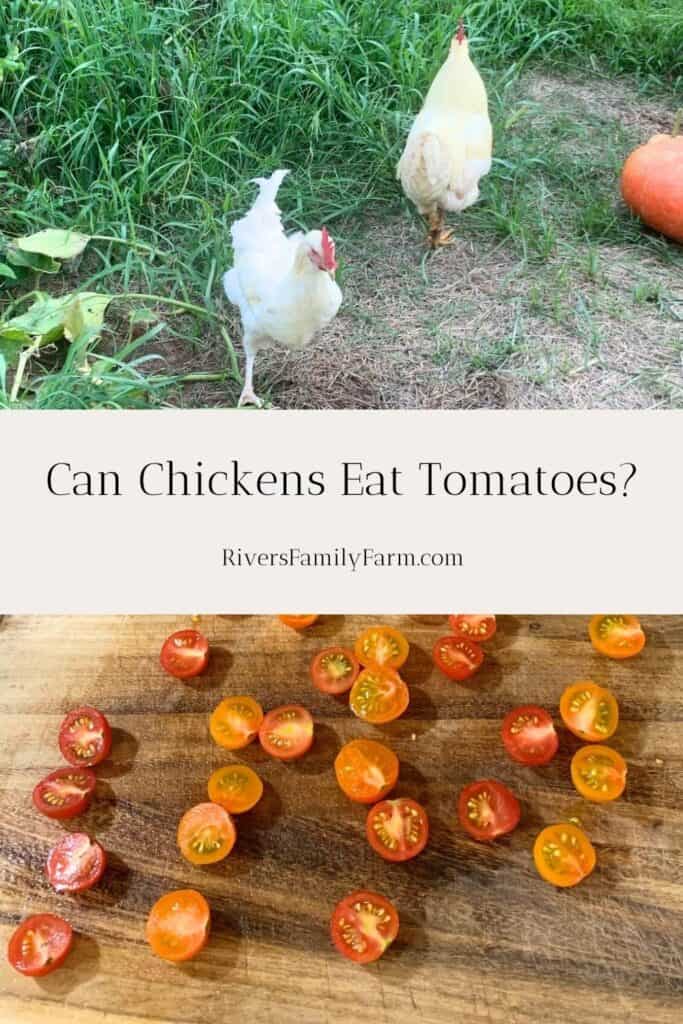
Other Related Posts
How much space do chickens need in a chicken coop?
7 Tips for Emotions to Raise and Harvest Meat
Easiest Home Pregnancy Tests for Livestock

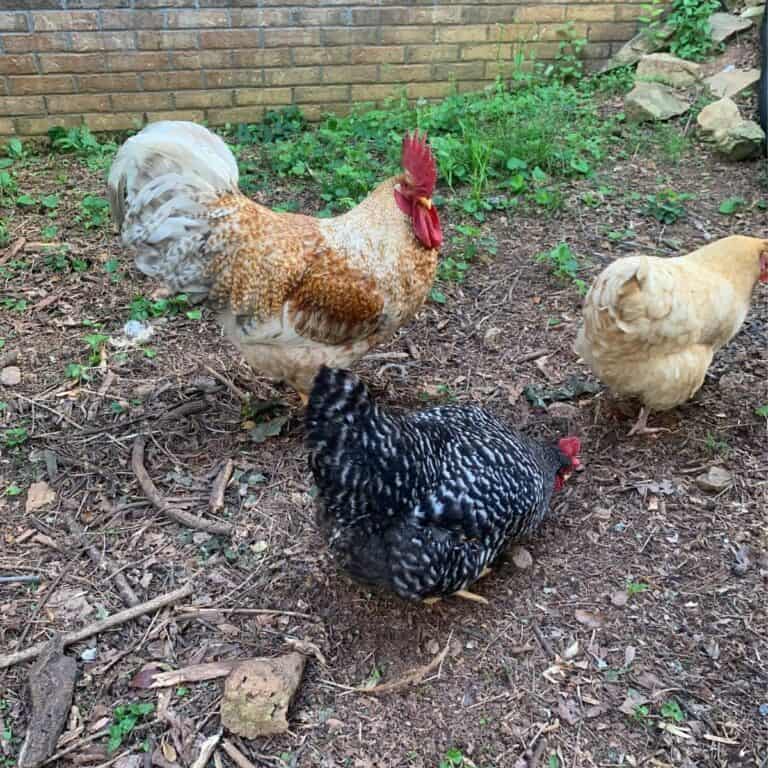
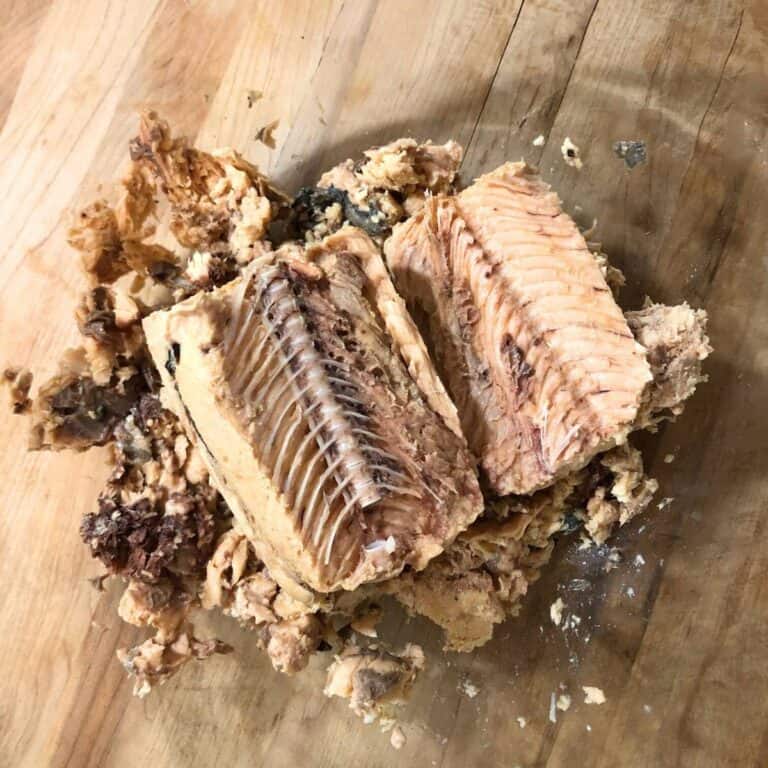
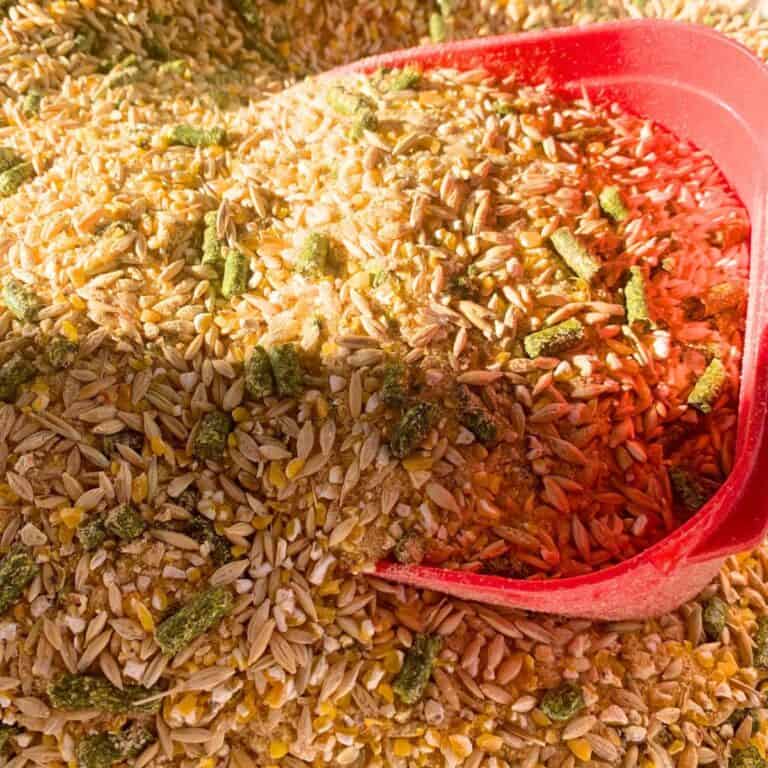
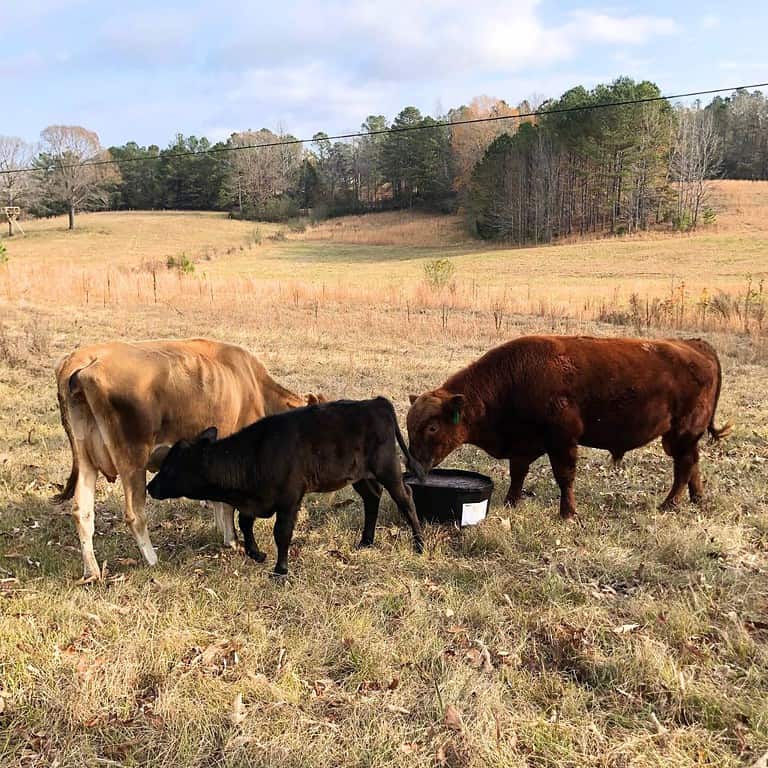

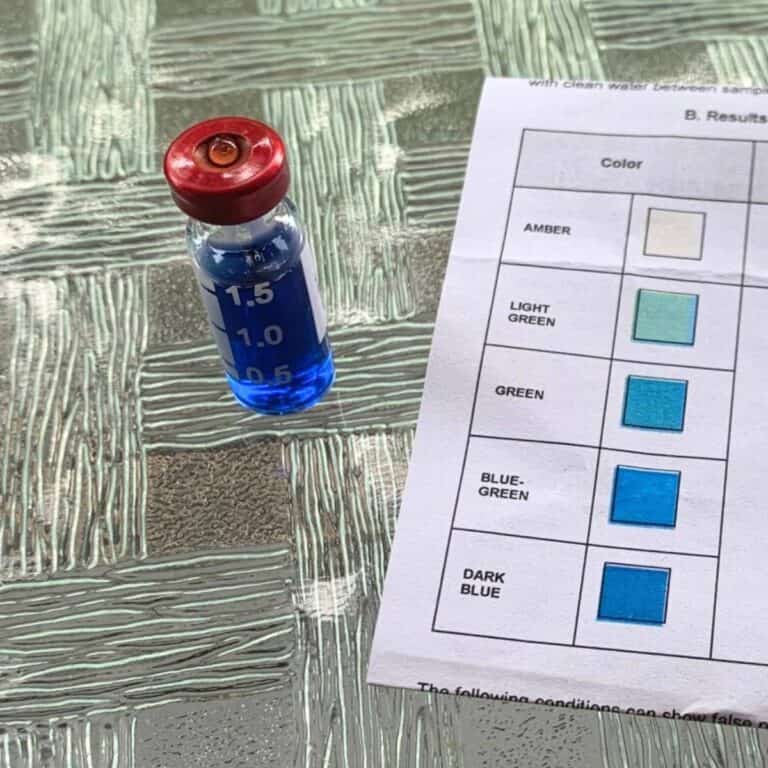
Good to know about the unripe tomatoes! Thanks for the great info!!
You’re very welcome! Just remember it’s all about moderation. A few unripe tomatoes won’t hurt them.